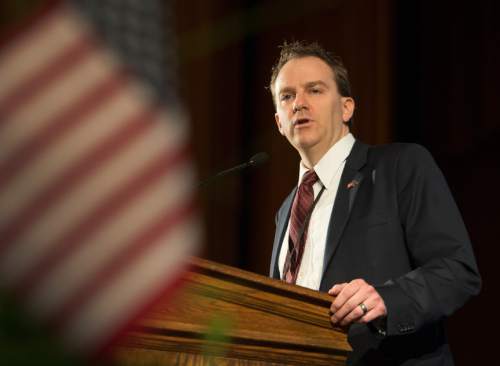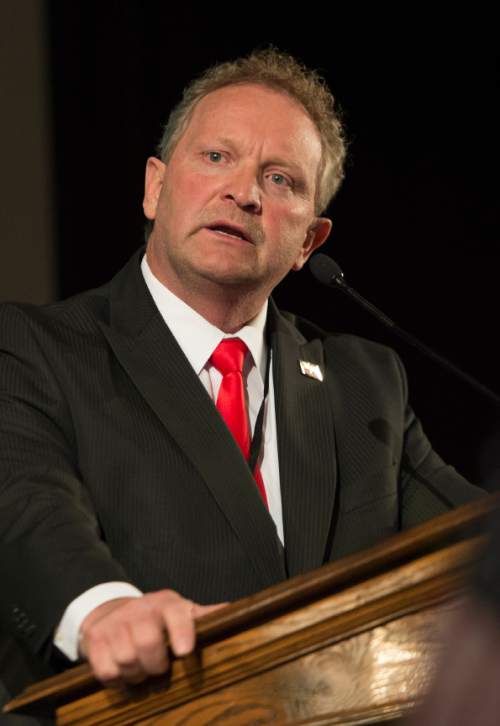This is an archived article that was published on sltrib.com in 2016, and information in the article may be outdated. It is provided only for personal research purposes and may not be reprinted.
If Rep. Rich Cunningham wins his primary on Tuesday against Sen. Lincoln Fillmore, both R-South Jordan, he still could face an unpleasant situation in the Senate: Most of his possible future GOP colleagues there made donations seeking to defeat him.
Thirteen Republican senators and a political action committee they control gave $36,000 to the recently appointed Fillmore — 47 percent of the total he raised. Most primary legislative races are costing less than $20,000 total this year.
The senators' money helped make the Fillmore-Cunningham race in southwestern Salt Lake County the state's most expensive legislative contest so far, with Fillmore outraising Cunningham $77,201 to $61,740.
Other examples of senators rallying to help colleagues and friends include them donating $10,000 to help Sen. Curt Bramble, R-Provo, in his race against former Rep. Chris Herrod. And retiring Sen. Scott Jenkins, R-Plain City, gave $6,000 to help his brother, Glen, in his race challenging Rep. Becky Edwards, R-North Salt Lake.
Caustic charges and counter-charges stemming from senators' involvement are spicing the Fillmore-Cunningham race.
Cunningham said the $36,000 that GOP senators gave his opponent is "totally out of control," and "people have said they have never seen this before in any Senate race."
He adds, "My opponent's campaign is unable to raise money to be effective so they have to lean on the Senate for their dollars and their support. He does not have the support from the business community."
Cunningham also says, "I've been told by certain senators that 'Rich is not coach-able, he's not teachable'" and won't follow party leaders. "To be frank, I'm not interested in representing the party bosses. My No. 1 priority is representing my constituents."
Still, Cunningham says of his possible future Senate colleagues, "I'm going to work with them. I'm not going to hold it against them. We're going to work together because I believe we're going to win next week."
Fillmore, meanwhile, says he is supported by his fellow senators because "I had a very successful first session in the Senate" and "they see that I am a positive contributor to the work that the Senate does."
He said he is the only K-12 educator there — as a charter school administrator — and "they appreciate the perspective that I bring. They appreciate the temperament that I bring. They appreciate the consensus building that I do and they appreciate the calm, collaborative approach that I take."
Fillmore attacks Cunningham's funding as coming from special interests.
"More than two-thirds of the donations to him are coming from lobbyists and special interests, particularly from car dealers who are paying him back for the votes he gave them against the interest of our districts," he said.
That refers to legislation affecting distances required between car dealerships. Places in their district such as West Jordan and Herriman contend rules and laws prevent dealerships there because of dealerships already in places such as South Jordan.
Disclosures show auto dealers donated around $5,000 to Cunningham, who says he voted for compromise changes agreed to by the auto industry and others. Fillmore says the laws still prevent free trade.
Cunningham fired back at Fillmore's claim that he is financed by special interests, saying, "My opponent makes his living off an industry [charter schools] that absolutely rises and falls on the generosity of the Legislature. If that's not a special interest, then I don't know what is." Many of his donations came from people in that industry, Cunningham adds.
Elsewhere, Bramble in his Provo race raised the most money of any legislative candidate in a primary: $101,037. Of that, $10,000 came from donations from four fellow senators, and a PAC for GOP senators. His opponent, Herrod, has raised only $6,077 — and is in debt by spending a total of $7,680.
In the race to replace retiring Sen. Al Jackson, R-Highland, Daniel Hemmert raised $76,030 — but $32,000 came from himself or his business interests. Meanwhile, former Rep. Morgan Philpot raised $8,405, including $3,066 from his own pocket in the contest.
In the House, Edwards outraised challenger Jenkins $24,00 to $12,696 in Davis County's District 20. The margin would have been far wider without the $6,000 that Jenkins received from his brother.
In an unusual move for a political party in a primary, the Utah County Republican Party gave $4,050 to Corey Maloy in his race against Mike Brenny in House District 6, being vacated by Rep. Jacob Anderegg. Brenny still raised the most, $24,844 compared to Maloy's $15,283.
Maloy won the party's convention, which Brenny skipped and instead gathered signatures to get on the ballot. The county party contends that Maloy earned its endorsement at convention, so it is spending to help him.
Twitter: @LeeHDavidson





